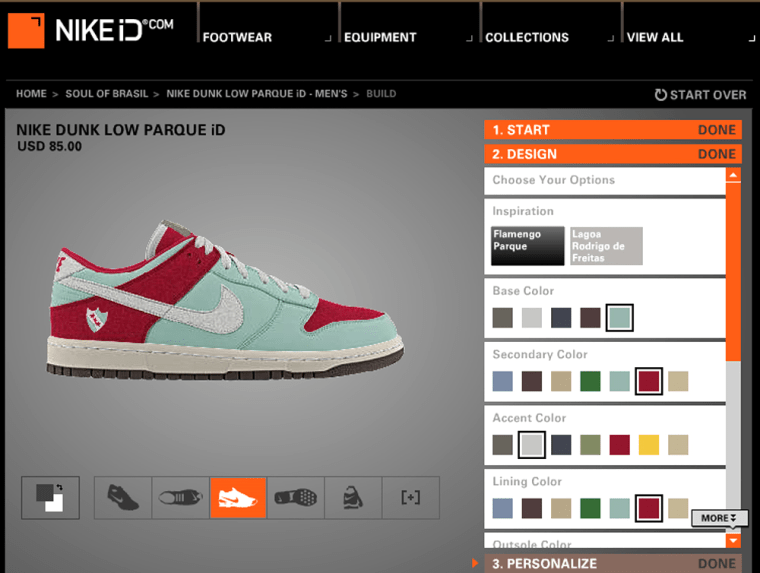Nike has a message for shoppers looking for the hottest shoe design: Just do it -- yourself.
The world's largest athletic shoemaker has relaunched a Web site where shoppers design their own shoes, choosing everything from the color of the famous Nike swoosh to personalizing the tongue with a word or phrase.
The bid to target shoppers who want to stand out marks part of a growing trend toward customization in retail that analysts see as a way for companies to charge a premium for self-styled products.
Customization also connects shoppers more closely with a brand and helps companies attract fickle but lucrative young shoppers by giving them the power to put their personal stamp on everything from sneakers to jeans to digital music players.
Whether it's a cell phone ring tone of a favorite song, a faux-fur skin for an iPod, or a pair of ice pink and black Nikes, young shoppers see customization as a way to express themselves and build on what they like about certain brands.
"It is really a democratic desire," said Sharon Lee, co-founder of Los Angeles-based consumer research and trend consulting company Look-Look Inc. "Every person wants to say this is much more me and I'm not part of this kind of mass culture."
Lee sees the customization trend growing, especially in the coveted youth market. Yet even as these shoppers increasingly demand customization, few retailers effectively mine this market, she said.
But Nike Inc. is trying. Nike spokesman Alan Marks said the company has operated Nikeid.com since 1999 but relaunched it in March with more styles and new technology, offering added choices to self-style products such as sneakers, bags and golf balls.
He said the Web site -- where most shoes cost $100 or more -- showed customers were willing to pay more for the chance to design their own sneakers. He declined to say how many shoppers had visited the Web site or how much business it had generated since the relaunch.
"Once you try it, you become vested in your own design," Marks said. "There is a Nikeid customer who sees value in being able to design their own shoe, and they are willing to pay a slight premium for that customization."
The relaunch of the site also comes amid a recent fashion shift to premium sneakers that has shoppers spending top dollar on athletic footwear.
Demand for athletic shoes that cost more than $100 grew 18 percent in the United States last year to almost $600 million, according to data from marketing firm NPD Group.
So far, Nike has backed Nikeid.com with a television and Internet marketing campaign in hopes of winning more customers in the lucrative U.S. market where the Beaverton, Oregon-based company's market share is more than twice that of each of its largest rivals, Reebok International Ltd. and Adidas-Salomon.
John Horan, who publishes the trade magazine Sporting Goods Intelligence, agreed the timing was right for Nike's renewed push.
The robust market for rare shoes on the Internet and at boutiques where collectors are willing to pay thousands of dollars for sneakers, shows consumers will pay more for something that is unique or at least rare, he said.
"Clearly, they can do more with the fact that the average price points are going up and consumers are willing to pay a little bit more," Horan said. "There is a market out there for rare kinds of shoes."
Other observers say Nike has simply learned that young shoppers now demand ways to differentiate the products they buy and that the customization trend will only get bigger.
Lori Holliday Banks, senior fashion analyst at TobeReport, said Nikeid.com showed how a preference for personalization, once seen as a preserve of the rich with monogrammed shirts and towels, was now in favor with a broad range of consumers.
"People want unique products because we are over-saturated with mass merchants at every level," Banks said.
